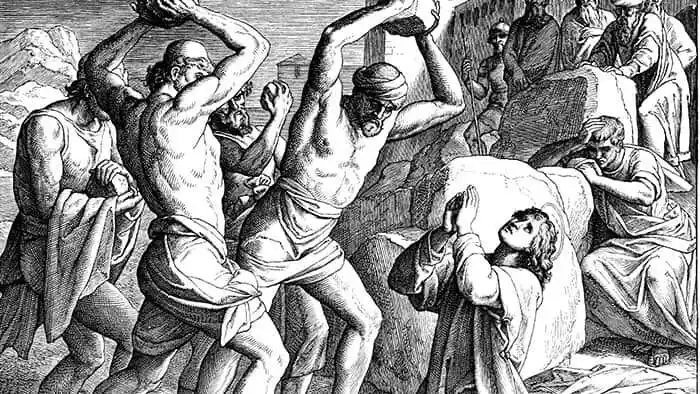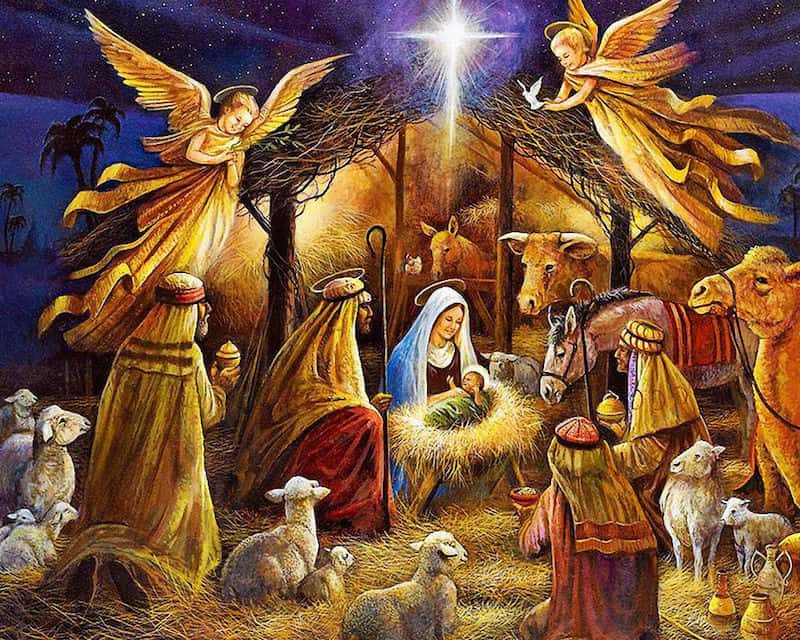
December 26 is the Roman Catholic Feast Day of St. Stephen, martyr of the faith taught to him by Jesus Christ. Stephen spoke against popular traditions then which humanity still loves now.
Many sources say that Stephen was stoned to death and one source even mentions Christmas, but what is the Christmas connection?
“Our celebration of St. Stephen today reminds us that Christmas is not all about eating and drinking. It is a celebration of the SACRIFICIAL LOVE of God for us. If God so loved us, we must love one another. If God so loved us even when we were His enemies, we must love our enemies and pray for them.” online source: https://dailymasses.blogspot.com/2023/12/what-st-stephen-teaches-us-about.html
Why mention Christmas at all if Stephen was not stoned for his teaching about the current Christmas celebrations in his time?
Stephen was murdered because of his words against Christmas traditions which are many of the same traditions of Saturnalia. He spoke the longest speech in the New Testament, Acts 7:2-53., which is why he was publicly stoned to death.
His words of truth that no one wanted to hear earned him death.
Stephen was one of the seven “deacons.” The apostles present felt they were too important to serve food. Instead, they felt they should be teaching and preaching and therefore chose seven men to serve the food. They dubbed the seven chosen by the apostles to help with the distribution of food “deacons.” Stephen was also known for his preaching and miracles and helping the poor. What he said at the time angered those present so much they made up false charges of blasphemy against him. He was called in to the Sanhedrin to answer the charges. It was Stephen’s speech before the Sanhedrin, the Jewish council, that led to his stoning.
What did Stephen say?
Many of the words of Stephen have been silenced and substituted with other words telling the human flocks of sheep what to think, say and do, specifically about Christmas. These words are not silent in the Bible in Acts 6-7, but you won’t hear that preached from any pulpit during the Christmas season, nor today, December 26 on the Feast Day of his stoning.
Stephen told them they were worshipping the pagan gods, Molech and Rephan.
Molech is the god of Saturn., the god of the Old Testament, the same god who makes a covenant in the Dead Sea Scrolls, in The Temple Scroll, II. It is there you will find the covenant between this god and the Jews wandering in the desert, if they would build him a Temple and supply him with bulls and blood, grain and wine, he would kill all their enemies.
Rephan is the god in the Old Testament called Baal, who is most is associated with the sacrifice of human babies during old rituals of Saturnalia.
Stephen challenged that the true God has no need of a Temple, that Jesus taught that every human being is a Temple of the Spirit of God, now known as Eternal Universal Light Force Energy, or the Light within you as Jesus taught in Luke 17:20-21.
When Stephen taught what Jesus taught him, Stephen was stoned to death for speaking against the current Christmas customs. How dare Stephen stop their fun and merriment through an inconvenient truth.
How are our Christmas traditions the same as the ones Stephen spoke against?
“During Saturnalia, work and business came to a halt. Schools and courts of law closed, and the normal social patterns were suspended.
“People decorated their homes with wreaths and other greenery, and shed their traditional togas in favor of colorful clothes known as synthesis. Even enslaved people did not have to work during Saturnalia, but were allowed to participate in the festivities; in some cases, they sat at the head of the table while their masters served them.
“Instead of working, Romans spent Saturnalia gambling, singing, playing music, feasting, socializing and giving each other gifts. Wax taper candles called cerei were common gifts during Saturnalia, to signify light returning after the solstice.
“On the last day of Saturnalia celebrations, known as the Sigillaria, many Romans gave their friends and loved ones small terracotta figurines known as signillaria, (those baby faces signifying making their first born ‘walk through the fire’ on Molech’s sacrificial alter) which may have referred back to older celebrations involving human sacrifice.
“Saturnalia was by far the jolliest Roman holiday; the Roman poet Catullus famously described it as “the best of times.” So riotous were the festivities that the Roman author Pliny reportedly built a soundproof room so that he could work during the raucous celebrations.” Source: https://www.history.com/topics/ancient-rome/saturnalia
Acts 6:2 says, “So the Twelve gathered all the disciples together and said, “It would not be right for us to neglect the ministry of the word of God in order to wait on tables.”
According to the Bible, on the 26th of December, while they were celebrating and feasting, Stephen said, “You have taken up the tabernacle of Molek and the star god Rephan, the idols you made to worship. Therefore I will send you into exile’ beyond Babylon.” Acts 7:43: https://biblehub.com/acts/7-43.htm
I suggest the party was the ever-popular Saturnalia festival which never stopped being celebrated, even by other religions, including the Jewish and new Christian people in Stephen’s time.
Let’s go back one verse, in Acts 6:1. What is going on here?
“In those days when the number of disciples was increasing, the Hellenistic Jews among them complained against the Hebraic Jews because their widows were being overlooked in the daily distribution of food.” New International Version (NIV)
It is said that Stephen was either a Greek or a Jew who had studied in Greece. He was also concerned that the Greek Jews, specifically the women, were not being considered in the daily allotments of food.
Remember that Stephen spent much of his time devoted to feeding the hungry, both Greek and Hebrew Jews, but his more important role was to teach what Jesus taught him, that everyone has the Kingdom of God, or the Light of God within each of them.
Stephen took offense at being expected to be a server of food at a pagan Saturnalia festival, which Jesus taught against.
During Stephen’s lengthy debate in Sacred Scripture, in Acts 7:2-53, and specifically in Acts 7:44-53, Stephen questions the audacity of Jewish belief that the god of the Old Testament is the same God, Almighty Father of Jesus Christ, especially in verses 48-50: “However, the Most High does not dwell in houses made by human hands. As the prophet says:
“Heaven is My throne and the earth is My footstool.
“What kind of house will you build for Me, says the Lord,
“or where will My place of repose be?
“Has not My hand made all these things?’” Isaiah 66:1-2
Stephen says in Acts 7:51-53, “You stiff-necked people with uncircumcised hearts and ears! You always resist the Holy Spirit, just as your fathers did. Which of the prophets did your fathers fail to persecute? They even killed those who foretold the coming of the Righteous One. And now you are His betrayers and murderers—you who received the law ordained by angels, yet have not kept it.”
The rational teaching of Jesus coming from the lips of Stephen could not be heard nor understood due to their misunderstood indoctrination. They did not recognize that prophecy was unfolding before their eyes.
During one debate with Diaspora Jews, Stephen’s speech in a temple so offended them that they accused him of blasphemy. He was arrested and charged with speaking against “this holy place and the law.” Stephen’s spirited defense included the implication that the Temple was idolatrous, comparable to Aaron’s golden calf.
“At this they covered their ears, cried out in a loud voice, and rushed together at him. They dragged him out of the city and began to stone him. Meanwhile the witnesses laid their garments at the feet of a young man named Saul, who condoned the stoning of Stephen. ” Acts 7:57-58
Saul was a Pharisee, and was the son of a Pharisee, mentioned in Acts 23:6. Saul, renamed Paul (after his vision of Jesus on the road to Emmaus), was an adopted apostle after the crucifixion of Jesus.
“While they were stoning him, Stephen appealed, “Lord Jesus, receive my spirit.” Falling on his knees, he cried out in a loud voice, “Lord, do not hold this sin against them.” And when he had said this, he fell asleep.” Acts 7:59-60
It is vitally important to understand that forgiveness is ours when we come to see the error of human because we too have been indoctrinated.
It is only when we personally come to terms that the Light of God dwells within each of us, that we truly are the Temple of God on Earth.”
God Bless Everyone Everywhere

